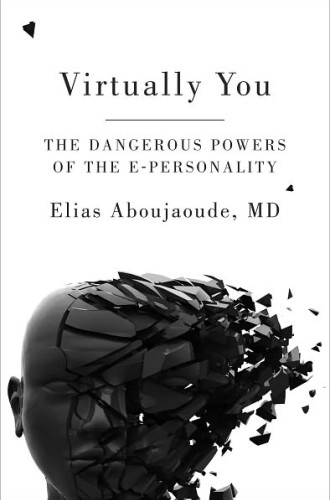Virtually You, by Elias Aboujaoude
A virulent danger lurks in our homes, in our offices and—very likely—in our pockets. It may rewire our brains and erect a barrier between us and our cultural heritage (says Nicholas Carr in The Shallows). It may play havoc with our personal relationships and our sense of identity (cautions Sherry Turkle in Alone Together).
It may even nudge us into full-fledged pathological behavior, either creating new disorders or bringing out abnormalities that already lie deep within us. So warns Elias Aboujaoude, a psychiatrist and the director of Stanford University's Obsessive-Compulsive Disorder Clinic, located in Silicon Valley, the world's technological heart.
Read our latest issue or browse back issues.
The danger, according to a swelling chorus of authors, is the Internet, or the way we use the Internet, or the way we have stopped doing a lot of things we used to do before the Internet took over our lives. "While the Internet is a force for good in many arenas," writes Aboujaoude, "it also has the power to interfere with our home lives, our romantic relationships, our careers, our parenting abilities—and our very concept of who we are."
Enough already. Do I need yet another book to tell me that the latest technology is messing with my head? Late medieval church leaders, after all, didn't care for Gutenberg's invention, without which the Reformation would have remained a purely local aberration. Early wireless sets worried some Christians until preachers figured out how to use the airwaves for evangelism. Television, many feared, would rot our brains and ruin our souls. We've somehow managed to survive printed material, radio and even TV's "vast wasteland"—so what's to worry about the Internet?
Plenty, says Aboujaoude, who "helped lead the largest U.S. study on problematic Internet use published to date," revealing "alarming rates of online pathological behavior that cut across geographic, socioeconomic, age, and gender differences." The Internet, he believes, contributes to disorders such as dissociation, grandiosity, narcissism, attention-deficit disorder, violence, infantile regression, lack of impulse control and failure of individuation. It leads to relational disasters, ignorance, polarization, security breaches and attacks on privacy. And to make things worse, it seems to be addictive.
Whew. No wonder that last week, when I needed to read over 1,500 pages, I had to shut down my computer. And no wonder that by Friday I felt so good.
To be sure, Aboujaoude hedges his jeremiad with qualifiers. As a good scientist should, he differentiates between causal certainties and mere correlations or probabilities. An Internet user himself, he recognizes that the virtual world is here to stay: "No one can imagine life without Google, and, even if it were possible, few people I know would be interested in living it." Unfortunately for readers who want to learn how to avoid Internet dangers, however, he offers "no secret recipe for how to extricate us from the virtual thicket." He is a psychiatrist, not a social engineer. His purpose, he says, is only to get us "to look through the laptop screen and into the mirror."
If you're not eager to examine dysfunctions that may at this very moment be festering below your level of consciousness, congratulations—you're probably normal. There are reasons we keep those things locked in our psychic cellars. There are also compelling reasons, though, to take Aboujaoude's argument seriously, and not just that he wrote the book on obsessive-compulsive disorder (Compulsive Acts: A Psychiatrist's Tales of Ritual and Obsession).
First, of course, is the same reason that we get colonoscopies: if something nasty is growing where we can't see it, it's good to find it and get rid of it before it takes over. Even if we don't think that our own Internet usage is causing any problems—denial is as strong in Internet slaves as in any other addicts—we might want to check out Aboujaoude's warnings to see if they apply to our employees, students or children.
A second reason to read this book, at least for the theologically inclined, is to gain a 21st-century perspective on sin. Not that Aboujaoude ever discusses sin; he uses the word only twice, and both times flippantly. Interestingly, though, he describes disorders matching six of the seven deadly sins that the church has condemned since at least the sixth century, gluttony being the lone exception: pride ("the Internet has the power to transform us into self-infatuated demigods"); greed ("once money goes virtual, debt stops scaring us"); envy ("many of us . . . use the Internet to actively reconfigure aspects of who we are, often with the hope that somehow this will make our real-life selves better, more popular, or more attractive"); anger ("members of online communities often feel empowered to engage in cruel outbursts that would violate their sense of decency in the real world"); lust ("over 10 percent of all Web pages, 25 percent of all searches, and 35 percent of all downloads are pornographic in nature"); and sloth ("mindless Web surfing, without forethought or plan, and without awareness of the passage of time or any real-life anchoring, is our era's very common version of the symptom of dissociation").
Just as a classical theologian might see individual sins as symptoms of an underlying condition called original sin (or, more ominously, total depravity), Aboujaoude sees Internet-associated disorders as symptoms of "the problematic, instinct-driven part of our psyche" that Freudians call the id. The id loves the freedom of the Internet. No superego demanding ethical behavior! No ego exercising "self-control, caution, and judgment"! Online—anonymous and omnipotent in our electronic universe—we become our own disordered gods.
So what's the harm? Can't we choose to act responsibly online? And even if we enjoy a little online acting out, can't we keep our Internet selves separate from our real selves? Not necessarily, says Aboujaoude. Online actions have real-world consequences. "Our e-personality—whether it is infantile, inflated, narcissistic, immoral, or impulsive—can be destructive, not just in the virtual world but in reality as well." The virtual world, he concedes, may not be "making us more bellicose, immature, and impulsive," but it may be doing something equally disastrous: "taking us back to something that might be called our 'state of nature.'" And in that state, according to the 17th-century philosopher Thomas Hobbes, we become ruthlessly competitive, combative, suspicious and proud.
Having led us to the borders of Armageddon, Aboujaoude exits on a cautiously optimistic note. "For all the problems . . . this machine might have introduced into our lives," he writes in the book's final paragraph, "we are not any lesser for it; only much more complicated." Virtually You, though easy enough to read, is pretty complicated itself. It asks us to endure a long presentation of problems without the solace of simple solutions. It suggests that we relate those problems not only to broad cultural changes but also to the inner workings of the human heart. It assumes that we will be able to recognize dangers without devaluing the medium through which they come. It hopes that having seen the dark side of the Internet, we will not succumb to it.
In short, it asks us to draw on the very capabilities that our Internet immersion may already have weakened or destroyed.







